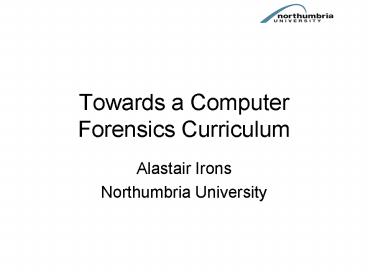Towards a Computer Forensics Curriculum - PowerPoint PPT Presentation
1 / 8
Title:
Towards a Computer Forensics Curriculum
Description:
... T., Irons, A. D., Laing, C., Mink, M., and Anderson P., (2006) Comparative Study ... Freiling, F., Anderson, P., Holz, T., & Mink, M., (2006) 'Developing Computer ... – PowerPoint PPT presentation
Number of Views:48
Avg rating:3.0/5.0
Title: Towards a Computer Forensics Curriculum
1
Towards a Computer Forensics Curriculum
- Alastair Irons
- Northumbria University
2
Objectives
- Set the scene
- Start discussions on curriculum
- Introduce Workshop 1
3
Computer Forensics as a Subject
- As a branch of forensic science
- As a branch of computer science
- a sub discipline of computer science
- A relative discipline of computer security
- As an interdisciplinary subject
- For example linked to computer science, forensic
science, law and criminology - As a discipline in its own right
4
Purpose of Computer Forensics Programmes
- To develop skilled professionals in computer
forensics in order to address employability? - To develop a bottom up or top down approach to a
specific branch of computing - To provide a course which will attract different
students to computing schools? - To contextualise computer science (see Irons and
Laing 2006) ?
5
What makes a Computer Forensics Programme
- No generally accepted curriculum
- No benchmark
- No professional body syllabus
- Undergraduate programmes
- Specialist module in final year ?
- Thread running through all levels (20 points per
level) - Development of a practical and theoretical body
of knowledge from year 1 to final year (20, 40,
40 plus project) - Role of joint programmes criminology or
forensic science or law ??? - Postgraduate programmes
- Specialist or generalist ?
- Stand alone or linked to security ?
6
Towards a Computer Forensics Curriculum
- Technical expectations and requirements
- Practical application
- Balance between theory and practice
- Theoretical underpinning
- different to computer science ? (explored in
workshop 2) - Legal and ethical requirements ?
- Particular pedagogic requirements
- Problem based learning, authentic learning ???
- Specialist subject based research
- Resource requirements
- Should curriculum be linked to accreditation and
licence to practice
7
Further Reading
- Irons, A.D. Laing, C., and Anderson, P., (2006)
Computer Forensics a Case Study on the Impact
of New Technology on Informatics Education,
paper presented at Informatics Education Europe,
Montpelier, France, November 8 9, 2006 - Dornseif, M., Freiling, F. C., Holz, T., Irons,
A. D., Laing, C., Mink, M., and Anderson P.,
(2006) Comparative Study of Teaching Forensics
at a University Degree Level, IMF 2006,
International Conference on IT-Incident
Management IT-Forensics, October 18 - 19, 2006
Stuttgart, Germany - Irons, A. D., Laing, C., Anderson, P., (2006)
Pedagogic Innovation in Teaching Computer
Forensics, paper presented at 7th Annual HE
Academy Conference for Subject Centre for
Information and Computer Sciences, Trinity
College, Dublin, 29 31st August 2006 - Irons, A. D., Laing, C., Dornseif, M., Freiling,
F., Anderson, P., Holz, T., Mink, M., (2006)
Developing Computer Forensics Programmes An
International Perspective, 1st Conference on
Advances in Computer Security and Forensics
(ACSF), School of Computing and Mathematical
Sciences, Liverpool John Moores University,
Liverpool, UK 13-14 July, 2006 - Staley, A. B., Inch, S., and Shapeero, M., (2006)
From CSI to classroom developing a computer
forensics degree program, in Information Systems
Control Journal, pp 39 43
8
Workshop 1 What makes a computer forensics
programme a computer forensics programme ?
- What do we need to cover in a computer forensics
curriculum ? - Are there a minimum number of computer forensics
credits required before an award can be titled
computer forensics ? - Is there a minimum expectation in the computer
forensics skill-set, application and / or
knowledge ? - What should the balance between theory and
application be ? - Flexibility to embrace advances in digital
forensics ? - What chapters would you expect to have in a
textbook covering computer forensics ?































